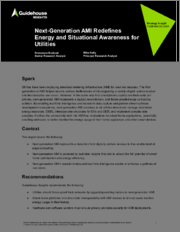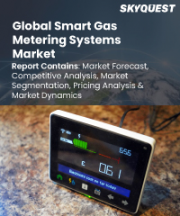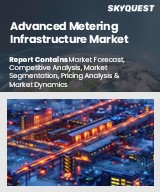
|
시장보고서
상품코드
1556459
유틸리티를 위한 에너지 및 상황 인식을 재정의하는 차세대 AMINext-Generation AMI Redefines Energy and Situational Awareness for Utilities |
||||||
전력회사들은 20년 이상 AMI(Advanced Metering Infrastructure)를 도입해 왔습니다. 1세대 AMI는 전력망과 소비자를 위한 다양한 이용 사례를 활용하면서 구시대적인 비효율성을 해결하는 데 도움이 되었습니다. 그러나 스마트폰이 초기 휴대전화를 빠르게 추월한 것처럼, 차세대 AMI는 논리적이고 혁명적이며 미래지향적인 에지 컴퓨팅 솔루션입니다. 차세대 AMI는 실시간 정보 및 파형 데이터 수집과 파트너 중심의 소프트웨어 개발 생태계를 통해 유틸리티가 분산형 에너지 자원(DER)을 감지 및 관리하고, EV 및 DER에 대한 요금 체계를 도입하고, 복잡한 요금 분석을 수행할 수 있도록 지원합니다. 또한 AMI에 내장된 커넥티비티는 스마트홈의 활용 영역에 영향을 미쳐 최종 사용자가 가전제품과 같은 스마트 기기의 에너지 사용량을 더 잘 모니터링할 수 있게 해줄 수 있습니다.
1세대 AMI 도입이 수명을 다함에 따라, 유틸리티 사업자들은 네트워크의 미래를 보장하고 자신과 고객의 에너지 사용에 대한 통찰력을 확보하기 위해 차세대 AMI를 선택하는 경향이 증가하고 있습니다. 이 보고서는 에너지 효율성, 사이버 보안 및 스마트홈 측면에서 차세대 AMI의 이점을 논의하고, 유틸리티 사업자뿐만 아니라 하드웨어 및 소프트웨어 공급업체에 대한 권장 사항을 제시합니다.
목차
- 서론
- 배경
- 제안
- 차세대 AMI : 디지털 구형 디바이스에서 진정한 엣지 컴퓨팅 지원으로의 전환을 의미
- DER, 에너지 효율, 고객 만족도 : AMI 2.0의 중요 촉진요인
- DER(분산형 에너지 자원)와 EV 관리
- 에너지 효율, 신뢰성, 가격 적정성
- 고객 만족도
- 스마트 미터가 엣지 컴퓨팅 플랫폼이 될 것
- 유틸리티 분석 전략 : 기술적/예측적인 것에서 규범적인 것으로 이동할 필요성
- 북미가 전개 건수의 대부분을 차지하지만, 기타 지역도 따라잡을 전망
- 실시간 인사이트를 기반으로 하는 차세대 AMI : 스마트 홈 최적화 및 에너지 효율의 잠재력을 최대한 활용하는 것을 목표로 한다.
- IEEE 2030.5가 스마트홈 통신 에코시스템에 참가
- AMI에 접속하는 브로드밴드 네트워크 역할
- AMI : 가정용 전력 모니터링 디바이스보다 소비자에게 있어서 액세스가 용이
- 스마트홈에서는 AMI와 가정용 전력 모니터링 디바이스가 공존 가능
- 차세대 AMI가 요금 체계 진보를 가능하게 한다
- 차세대 AMI 파형 데이터와 실시간 인텔리전스에 의해 다양한 이용 사례가 실현·강화
- 유틸리티는 기존 계량기를 차세대 AMI로 업그레이드하여 네트워크의 미래를 대비해야 한다.
- 스마트 홈 플랫폼은 최종 사용자가 가정 내 에너지 사용량을 모니터링할 수 있도록 AMI 장치와의 상호 운용성을 지원해야 한다.
- 하드웨어 및 소프트웨어 공급업체는 AMI 배포를 위한 개인정보 및 데이터 보안을 보장해야 한다.
Utilities have been deploying advanced metering infrastructure (AMI) for over two decades. The first generation of AMI helped resolve archaic inefficiencies while supporting a variety of grid- and consumer-oriented analytics use cases. However, in the same way that smartphones rapidly overtook early cell phones, next-generation AMI represents a logical, revolutionary, and future-proofed edge computing solution. By enabling real-time intelligence and waveform data capture and partner-driven software development ecosystems, next-generation AMI promises to let utilities detect and manage distributed energy resources (DER), introduce rate structures for EVs and DER, and implement complex rate analytics. Further, the connectivity built into AMI has implications for smart home applications, potentially enabling end users to better monitor the energy usage of their home appliances and other smart devices.
As first-generation AMI deployments reach the end of their lifespans, utilities are increasingly opting for next-generation AMI to future-proof their networks and unlock insights into energy use for themselves and their customers. This Guidehouse Insights report discusses the benefits of next-generation AMI in the context of energy efficiency, cybersecurity, and the smart home, and provides recommendations for utilities as well as hardware and software vendors.
Table of Contents
Spark
Context
Recommendations
Next-Generation AMI Represents a Transition from Digitally Archaic Devices to True Enablement of Edge Computing
DER, Energy Efficiency, and Customer Satisfaction Are Key AMI 2.0 Drivers
DER and EV Management
Energy Efficiency, Reliability, and Affordability
Customer Satisfaction
Smart Meters Have Become Edge Computing Platforms
Utility Analytics Strategies Should Move from Descriptive and Predictive to Prescriptive
North America Dominates Deployments, but Other Regions Will Catch Up
Next-Generation AMI Is Powered by Real-Time Insights That Aim to Unlock the Full Potential of Smart Home Optimization and Energy Efficiency
IEEE 2030.5 Will Join the Smart Home Communications Ecosystem
The Role of Broadband Networks in Connecting AMI
AMI Is More Accessible to Consumers Than In-Home Power-Monitoring Devices
AMI and In-Home Power-Monitoring Devices Can Coexist in the Smart Home
Next-Generation AMI Will Enable Advances in Rate Structures
Next-Generation AMI's Waveform Data and Real-Time Intelligence Enable or Enhance a Plethora of Use Cases
Utilities Should Future-Proof Their Networks by Upgrading Existing Meters to Next-Generation AMI
Smart Home Platforms Should Enable Interoperability with AMI Devices to Let End Users Monitor Energy Usage in Their Homes
Hardware and Software Vendors Must Ensure Privacy and Data Security for AMI Deployments



















